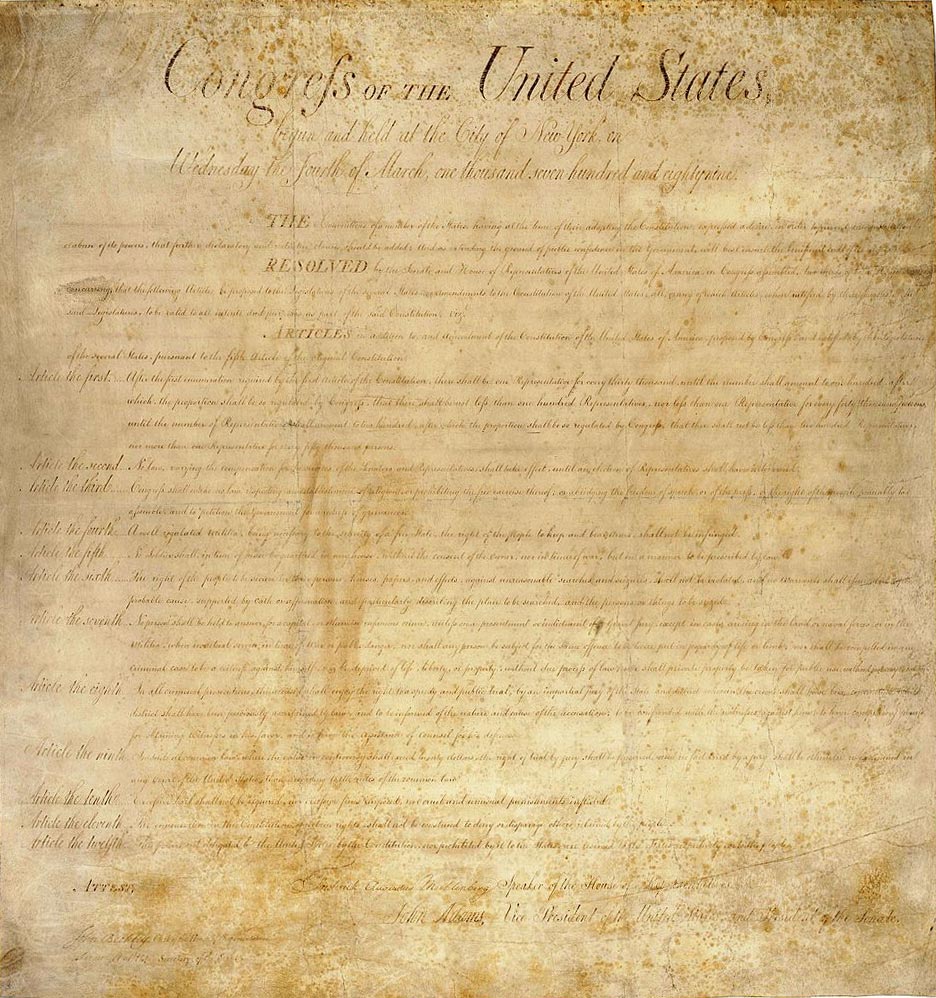| United States Constitution | |
|---|---|
 |
|
| The U.S. Constitution | |
| Preamble | |
| Articles of the Constitution | |
| I ‣ II ‣ III ‣ IV ‣ V ‣ VI ‣ VII | |
| Amendments to the Constitution | |
| Bill of Rights | |
| I ‣ II ‣ III ‣ IV ‣ V ‣ VI ‣ VII ‣ VIII ‣ IX ‣ X | |
| Additional Amendments | |
| XI ‣ XII ‣ XIII ‣ XIV ‣ XV ‣ XVI ‣ XVII ‣ XVIII ‣ XIX ‣ XX ‣ XXI ‣ XXII ‣ XXIII ‣ XXIV ‣ XXV ‣ XXVI ‣ XXVII | |
| View the Full Text | |
| Original Constitution | |
| Bill of Rights | |
| Additional Amendments |
The Sixth Amendment to the U.S. Constitution is part of the Bill of Rights which was ratified in 1791. The amendment sets forth rights that are related to criminal prosecutions. This amendment is based on the belief that justice delayed is justice denied. In its first clause, it tries to balance individual and societal rights by requiring a speedy trial. The amendment also suits the democratic prospect of fairness and transparency in criminal law by requiring public trials consisting of impartial jurors.
Text
In all criminal prosecutions, the accused shall enjoy the right to a speedy and public trial, by an impartial jury of the State and district wherein the crime shall have been committed, which district shall have been previously ascertained by law, and to be informed of the nature and cause of the accusation; to be confronted with the witnesses against him; to have compulsory process for obtaining witnesses in his favor, and to have the Assistance of Counsel for his defence.
Right to a Speedy and Public-Trial
 This clause reiterates the defendant’s rights to a speedy trial. It has a 4 part test that determines whether the defendant’s right to a speedy trial has been dishonored or not. The 4 factors considered in the test include: the justification for the delay, length of the delay, prejudice to the defendant due to the delay and whether the defendant has affirmed the right. If the defendant’s rights have been violated according to the Supreme Court’s rule, the charges should be dismissed completely.
This clause reiterates the defendant’s rights to a speedy trial. It has a 4 part test that determines whether the defendant’s right to a speedy trial has been dishonored or not. The 4 factors considered in the test include: the justification for the delay, length of the delay, prejudice to the defendant due to the delay and whether the defendant has affirmed the right. If the defendant’s rights have been violated according to the Supreme Court’s rule, the charges should be dismissed completely.
On the other hand, the Supreme Court limited the right to public-trial part; whereby a court can limit the access to a trial if exposure would destabilize the defendant’s due-process rights. The defendant can also request for a closed trial, but he or she must prove that a public trial will obstruct his or her rights to a fair hearing.
Impartial Jury
This is the second principle of the five parts that make the Sixth Amendment. In this principle, a defendant has a right to a jury at most trials. However, if the crime carries a sentence lasting 6 or less months, the trial may be conducted by a judge only. The defendant does not only have a right to a jury, but also to an impartial one. This means that, the members of the jury must not be biased and the pool from which the jurors are selected should represent a fair cross-section of the community.
When cross examining the jury, the defense and the prosecution can ask the prospective jurors some questions whose answers may show bias. Members of the jury who show any evidence of bias may be discharged. Several peremptory challenges are also allowed to each side, meaning that some potential jurors may be dismissed for no apparent reason. However, the challenges must not be based on sex or race.
Notice of the Charges
This principle requires that the defendant be informed of the cause and nature of the accusation. That means that the defendant should be presented with the charges from the government in a formal manner. In case of a felony, the presentation is done with an indictment (a comprehensive account of the charges against the defendant). Usually, the indictment is read in an open court and the judge asks the defendant if he or she understands it.
On the other hand, a misdemeanor is arraigned by information. Due to this constitutional requirement, the information and indictments must be precise and state all elements of crime which a defendant is charged with.
Confrontation Clause
In this section of the amendment, a defendant must get a chance to cross-examine and face up any witness against him or her to ensure that the witnesses’ statements are captured in an open case and that his or her due-process rights are sustained. The defendant is also eligible to call witnesses on his or her behalf.
Right to an Attorney
The 5th and 6th Amendments give a defendant the right to an attorney. However, the 6th Amendment appends after the defendant has been charged with a crime. This means that, the defendant has no right to an attorney until he or she is arraigned in court and told of the charges as well as his or her rights.
Although indigent defendants are provided with attorneys even in the lower courts; if the crime committed does not have a jail time, then the defendant does not have any constitutional right to an attorney. Since most of defendants are usually provided with an attorney, the Supreme Court requires those attorneys to be reasonably effective during their representation.
However, it is difficult to prove that an attorney was indeed ineffective while representing a defendant. In addition to that, the Supreme Court allows a defendant to represent herself or himself, unless the judge finds that the defendant is mentally sick or is incompetent to defend herself or himself. When the defendant requests for a self-representation, the judge must warn him or her of the disadvantages and dangers of doing so.